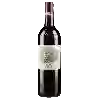
Winery La GuyennoiseSublime Verger
This wine generally goes well with poultry, beef or veal.
Food and wine pairings with Sublime Verger
Pairings that work perfectly with Sublime Verger
Original food and wine pairings with Sublime Verger
The Sublime Verger of Winery La Guyennoise matches generally quite well with dishes of beef, veal or game (deer, venison) such as recipes of quick meatloaf, ardéchoise fly or duck fillets with honey.
Details and technical informations about Winery La Guyennoise's Sublime Verger.
Discover the grape variety: Bertille Seyve 872
Interspecific crossing made by Bertille Seyve (1864-1944) between 85 Seibel and 2 Gaillard. This direct producing hybrid was mainly multiplied in the center of France where we found it and photographed it, but also in the departments of the Rhone valley, the Loiret valley, Isère, Vienne and Nièvre.
Informations about the Winery La Guyennoise
The Winery La Guyennoise is one of wineries to follow in Bordeaux.. It offers 675 wines for sale in the of Bordeaux to come and discover on site or to buy online.
The wine region of Bordeaux
Bordeaux, in southwestern France, is one of the most famous, prestigious and prolific wine regions in the world. The majority of Bordeaux wines (nearly 90% of the production Volume) are the Dry, medium and Full-bodied red Bordeaux blends for which it is famous. The finest (and most expensive) are the wines of the great châteaux of Haut-Médoc and the right bank appellations of Saint-Émilion and Pomerol. The former focuses (at the highest level) on Cabernet Sauvignon, the latter on Merlot.
The word of the wine: Basic wine
Dry, still wine intended for the production of sparkling wines (champagne, crémants, etc.). The basic wines undergo a second fermentation in the bottle for the production of carbon dioxide, and therefore of bubbles.














